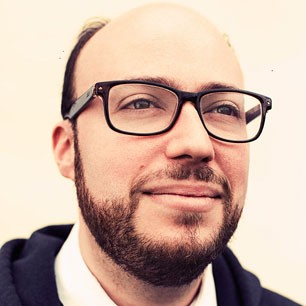 You are no doubt aware that young Sean Michaels won the 2014 Giller Prize for his first novel, Us Conductors. I loved the title at first sight, although I confess to having imagined the book would involve buses. It doesn't. It's about Lev Termen, the inventor of the theremin, and so it's very much about music (not surprising, as Sean has been running Said the Gramophone for years, and also writes a music column for the Globe and Mail). It additionally pins down ideas of love, and of destruction and rebuilding in the twentieth century. It's told in Lev's voice, with perfect, tiny slips in English idiom that echo the story's miscommunication motifs, so I was glad to talk with Sean about first-person novels when I met him in Toronto in May. I will not forget sharing a peculiar dessert with him and his wife Thea. I'm also glad he had a little time, while sitting on a plane--this man is busy, y'all--to answer my questions here. 1. Did you have any alternate titles for your book? What made you pick Us Conductors? Did that come to you fully formed at the start, or later? One of the first things to come to me was the title of this book. In fact I think my first draft was mostly an attempt to write the book that fit the title. But that title wasn't Us Conductors. For years the filename for this manuscript was IN WHICH I SEEK THE HEA.doc. And the title at the top of the first page was what is now the subtitle, hidden inside the final cover: In Which I Seek The Heart Of Clara Rockmore, My One True Love, Finest Theremin Player The World Will Ever Know. A mouthful! But I imagined it in the tradition of the lengthily-titled contemporary novels that were in fashion at the time. Then when it came time to show the book to my agent, one of her first comments was, "About that title..." I was ready for the criticism; I was already over it. And the ungrammatical Us Conductors came to me a day or two later - a riff on one of the book's most important themes, in the tone of voice of Jazz Age lovers. 2. How did you start this book--an image, a word, a general idea? I knew I wanted to write a novel about Termen and the theremin but what crystallized the project was some opening lines. The narrator's tone of voice, his statement of purpose - hackneyed sentences that didn't survive the third draft. 3. How did you find the sense of an ending--did you know when to finish? Did the ending remain the same through different drafts? I wrote Us Conductors from a detailed outline. I knew how I wanted to end it and that's how it ended; what changed was the absence or presence of the postscript, a vacillation about how little (or how much) to answer. 4. Could you choose a symbol to represent your book? A shape, person, piece of music, anything you like? A woman's hand as it moves across open space, entering a field or leaving it. 5. Did the book grow out of autobiographical experience? Did writing it change your view of the past? Since my youth I have been interested in the idea of untrue love, lying true love: the illusion that the universe is pointing you toward someone. This book helped me meditate on that; helped me put the matter to rest, perhaps, or to better understand the way a deceived, would-be lover may be responsible for their own deception.
0 Comments
Leave a Reply. |
ALIX HAWLEYI'm the author of My Name is a Knife, All True Not a Lie In It, and The Old Familiar. Archives
February 2021
Categories |
 RSS Feed
RSS Feed
